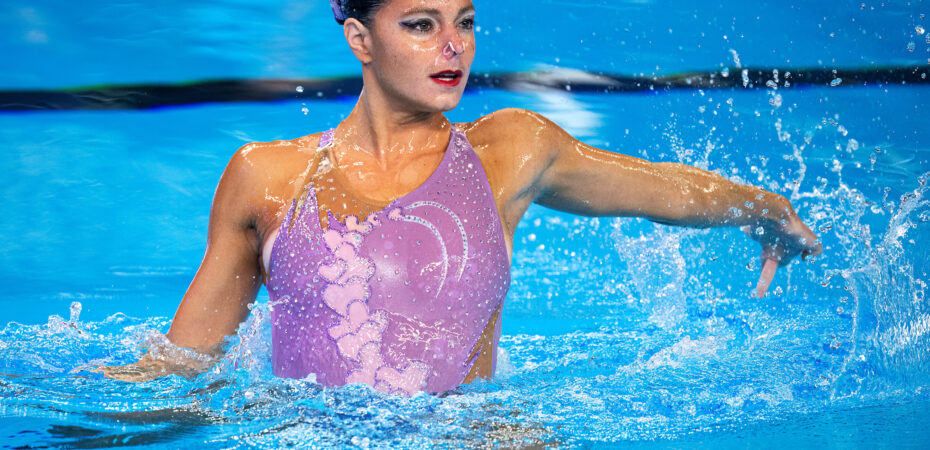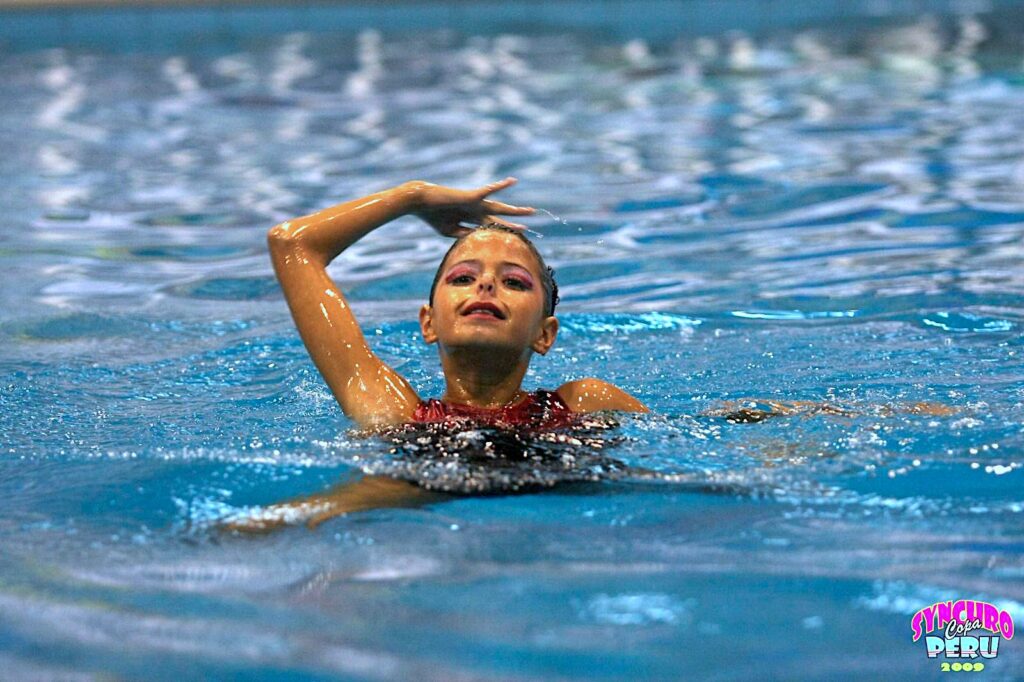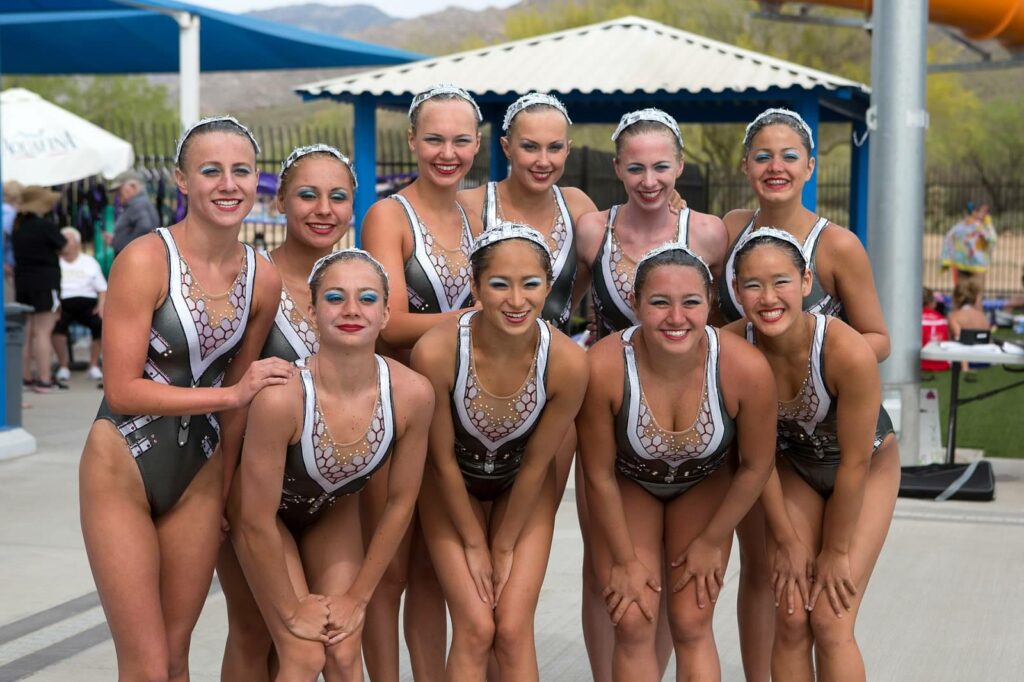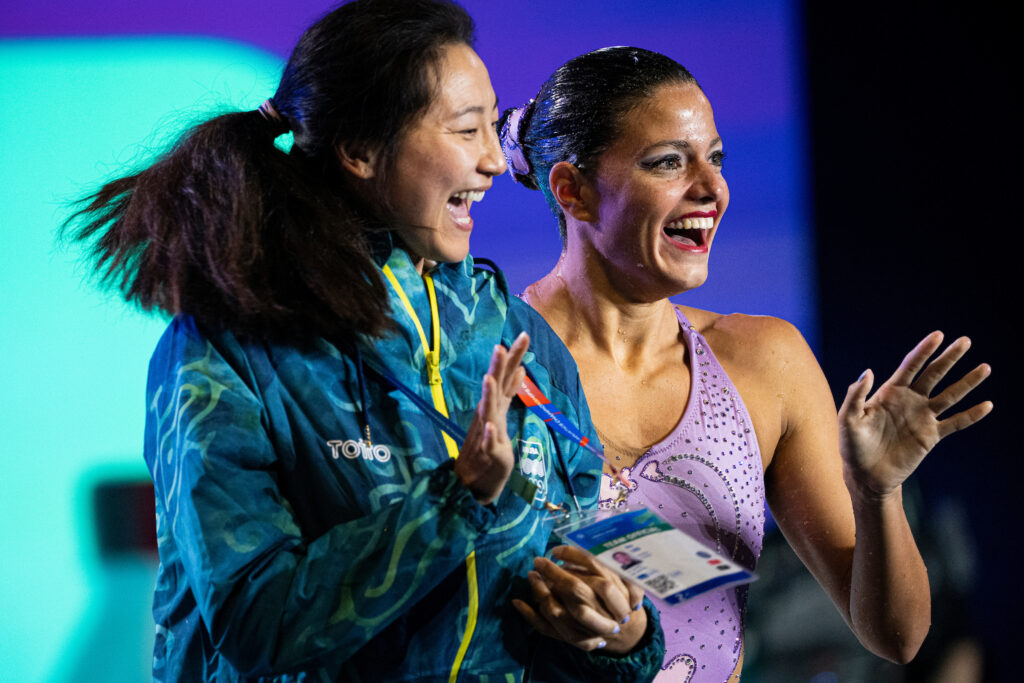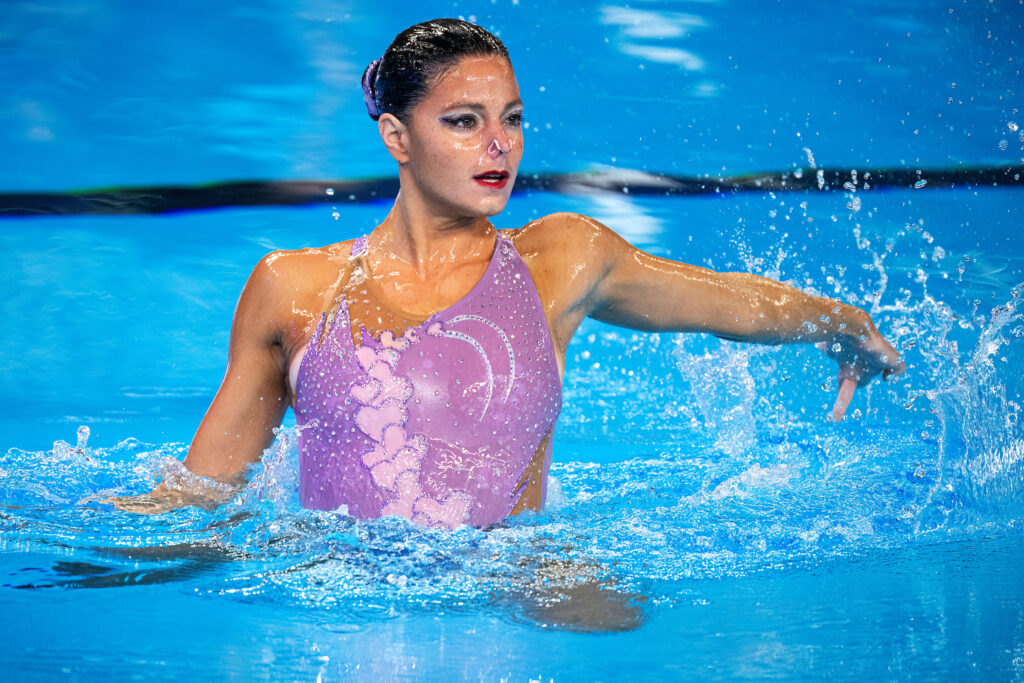At 12 years old, Kyra Hoevertsz of Aruba already knew she wanted to pursue artistic swimming at a high level. So, as a young teenager and after convincing her parents, she left her home island to move to the United States, and spent three seasons with the renowned club of Walnut Creek Aquanuts. In 2013 and at only 15, she represented Aruba at the World Championships, and has virtually never stopped since.
At 26, Hoevertsz has now competed in two Pan-American Games and six World Championships. In 2023, she notably won six medals at the Central American and Caribbean Games, and qualified to the technical and free solo finals for the first time at the World Championships. Most recently, she won a bronze medal in technical solo at the 2024 Beijing World Cup, and qualified to the technical solo and free duet finals at the World Championships.
Now, over a decade after her debut on the world stage and following a streak of historic results for Aruba, Hoevertsz spoke with us about her career so far as well as her plans for the future.
Inside Synchro: How did you first discover artistic swimming?
Kyra Hoevertsz: My grandmother actually started the club here in Aruba. My mother and my aunt swam together their entire lives, so that’s obviously how I knew about the sport. When I was seven, I was speed swimming and I didn’t want to begin synchro. My mom said, “Just try it!” I was like, “Okay, mom, I’ll do it for one year to make you happy, but then I’m gonna go back to swimming.” But then I ended up loving it.
IS: Could you tell us a little bit more about your family’s connection to the sport? Your mom and your aunt swam duet at the 1984 Olympics, right?
KH: Yes. There wasn’t a pool back then in Aruba, so they used to train at a hotel that had one. Obviously it wasn’t an adequate pool or anything, but it was a pool. When they talk about it, they tell me that they were so in love with the sport that they would just go every day, swim, and make up their duet. And then they competed at the ’84 Games.
My mom is part of the technical committee for World Aquatics and is quite the pillar for Aruba artistic swimming. And then the aunt whom she swam with, Nicole, is now the vice-president of the International Olympic Committee. They’re both still very involved with sports— in Aruba, but also internationally, and they really love it.
IS: What was it like competing your first World Championships at only 15 years old?
KH: My first Worlds were in 2013 in Barcelona, Spain. I don’t even remember being nervous, because I was still at the age where I wasn’t really aware of what was happening. I was swimming duet with Anouk Eman who was better than me at the time, so I was still the young one with all of the mistakes! So my first Worlds weren’t anything special; they were just special because they were my first ones. It was really just getting to know what it means to be around the top athletes of the world.
I do remember seeing the Russian soloist warm up for her solo— she had a thrust with a middle split and a spin. And she kept falling in the spin! She tried and tried and tried. And then during the competition, I saw that she took the spin out. You know, we can’t do that anymore, but back then you were able to change. I remember going, “Huh! Even the Russians can get nervous or have a bad day.” I started getting a lot more competitive at the next World Championships in Kazan, Russia.
IS: After Walnut Creek, you then attended and swam for Lindenwood University. What was this collegiate synchro experience like?
KH: I started in the fall of 2016, so that was after we just missed the qualification for the Rio Olympics. I kind of wanted to quit, but I also kind of wanted to keep going. When I got the acceptance letter from Lindenwood, I was like, “Okay, maybe I’ll just do some college [synchro], because it is supposed to be fun.” And it really was.
Probably most of my learning in regards to teamwork— working with coaches, or working with people that you like and don’t like— was in college. If you want to, you can choose to fall in love back with the sport, and that’s what I did. I used Lindenwood for that because I really wanted to see if I wanted to keep going at a high level after completing college. And I was able to fall in love with the sport again. If you’re in a good environment, it’s a really fun sport. I was also able to get my bachelor’s [degree], so it was a two-in-one.
IS: Your duet for Aruba was awarded financial support through the World Aquatics Scholarship Programme for the 2023 – 2024 season. How did that contribute to all of your training opportunities?
KH: That was perfect for us because we couldn’t train in Aruba as there’s no pool available except for at four in the morning; the swim clubs take priority. So basically, we moved to California for seven months, and we trained with Ou [Liu]. The scholarship really helped with the payment for that.
Bill May was also incredibly helpful in this journey. He let us stay at his house, and we could use Santa Clara’s pool time as well. They didn’t charge us anything extra for that. So the scholarship went purely to our travel, food, and recovery. The whole experience ended up being absolutely beautiful.
IS: Can you tell us more on that? How did you and Mikayla [Morales] actually end up in California?
KH: In 2023, we had a coach for the Pan American Games, Tania [Rudkovska]— who is Ukrainian, but lives in Switzerland. But then I got sick, and we didn’t end up competing at that meet. Anyways, Tania’s contract was only until that competition, so when we came back to Aruba in November, we obviously needed a new coach. So we reached out to Bill, because Bill’s, like, the nicest person ever.
Originally, we asked for someone to come to Aruba. But Bill said that Coach Ou, who works at the Santa Clara Aquamaids, could take us, but we’d have to go there. At first, we said no because we’re never at home. We had also never spoken to Ou before we went to California and had never heard about her, but both Bill and Tania convinced us. We were like, “Okay, we’re just trying. We’re gonna go after Christmas, and stay until [the World Championships in] Doha in February.”
But then Doha went really well— way better than we expected. We saw the big improvement that we made only in that month and a half training with Ou. So, after Doha, since we were the alternate duet for the Olympics, people told us that we had to keep going, because you never know what could happen. So, we continued, all the way to the World Cup Super Final in Budapest in July.
Everything was a good experience. Ou is really good at being a coach when she has to be, and then just being a friend of ours when we were out of the pool. She also has this really calm aura; you can’t be nervous with her as a coach.
She was really focused on training our minds so that when we would compete, we’d only think about what we could control. I was never thinking, “I need to swim basemark-free because I want to win a medal.” Because that’s when we started freaking out. We were really trained differently than in the past, and it was really calm going into every competition.
IQ: What have you and Mikayla’s historic placements in international competitions these past seasons meant for you as well as for Aruba?
KH: With the results being so good, obviously, Aruba was so happy with duet and solo. So for us, that brings great pride. Personally, I’m super patriotic. I absolutely adore Aruba, and I am extremely proud that I can represent this tiny country, get Aruba’s name out there, and take its flag with me everywhere.
It’s very cool to be able to say that Aruba belongs to the top eight in the world right now in solo, and top 12 in duet. We worked really hard to get there. It really is an honor to be able to represent this tiny island of 110,000 people.
IS: At one point in your career, you had taken a kind of break from synchro and went back to competitive swimming— could you tell us a little about that?
KH: Back in 2019 after the Pan American Games, I switched duet partners and we had moved to Canada to train with Leslie Sproule, our coach at the time. And then, COVID-19 hit. We had just come back from the World Cup in France when everything shut down.
I was going crazy in Canada. In Aruba, there was curfew and everything, but if you were an athlete, you were allowed to go out and swim in the sea, for example. So, my parents helped me get back home to the island, thankfully.
During that period, there obviously wasn’t any competition. There was nothing happening in Aruba, and people were quitting the sport. I started feeling like I was trying way too hard to make something work that clearly wasn’t supposed to be working.
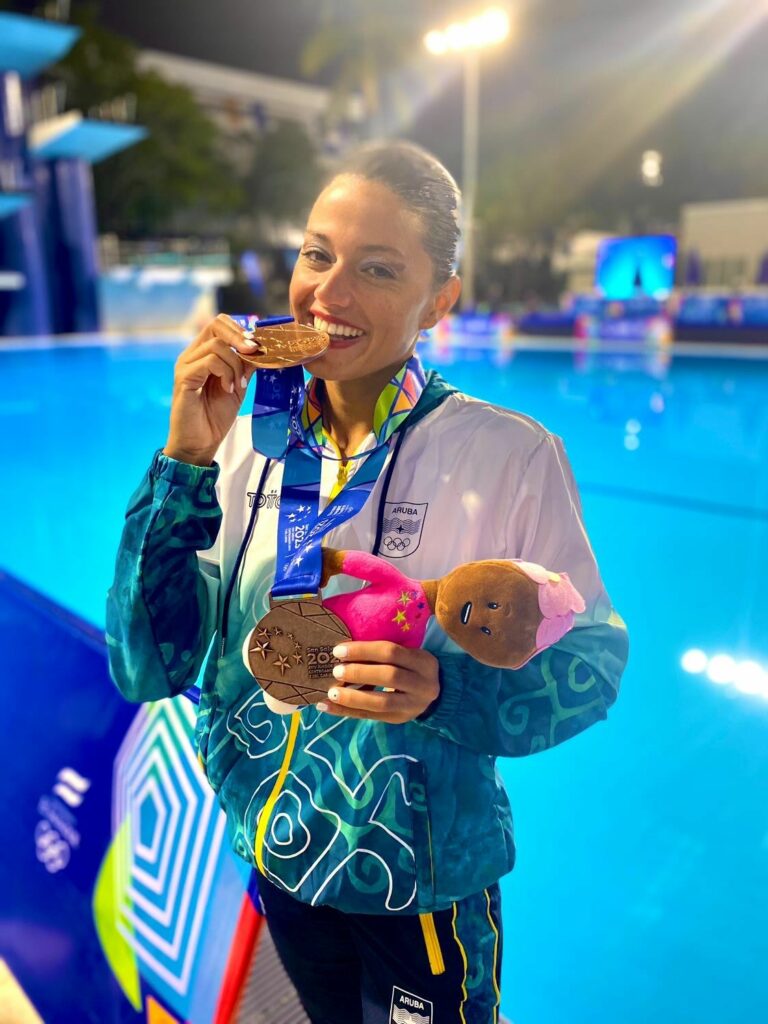
So I was swimming, just to stay in shape. There was a swimming competition in Paraguay at the end of the year. So, I went there, it was fun, and I got to experience a whole different vibe. At the end of the day, this break was good because I also learned how to use the water a lot more. It sounds crazy, but swimming really taught me how to grab more water, how to flow more, how to move faster, and how to do underwaters more.
It also made me miss artistic swimming. You know, sometimes you really have to realize if you actually like it, or if you’re gonna miss it if you’re not doing it. After a year and a half, I was missing doing the upside down twirls and stuff.
So in 2022— I think August— I started synchro again. I’m happy I came back, because that’s when the best results started coming in. 2023 was a really good year, and 2024 was even better. So, we only go up from here.
IS: You mentioned in another interview back in February that you were planning to retire after the 2024 season — what made you change your mind?
KH: I really was planning on retiring. I was so set on it. But I still enjoy artistic swimming too much to retire. I really started missing it when I was on my vacation after Budapest. I talked to Ou about it and she was like, “You know, Kyra, I think you should keep going. At least one more year. You never know.” So I decided, “Okay, let me just do next year, do the World Cups, the World Championships in Singapore.”
Right now, I’m the only senior Elite because Mikayla went to study in the Netherlands. If Aruba’s able to get one of the junior girls ready for duet, great. If not— and I can’t stress about it— I can focus on solo and see how well that goes. It might actually be good to just solely focus on that, like most of the other soloists do. Actually, I’m currently back with Tania for a training camp in Switzerland, and then I’m going to the Netherlands to keep training there, too.
I gotta go for it. I’m not ready to stop yet.
Article by Marikit Flores
Cover photo: Giorgio Perottino / Deepbluemedia
If you’ve enjoyed our coverage, please consider donating to Inside Synchro! Any amount helps us run the site and travel costs to cover meets during the season.

